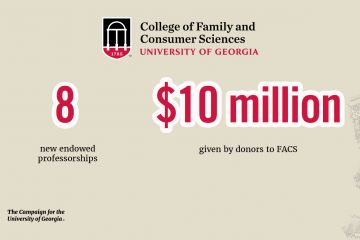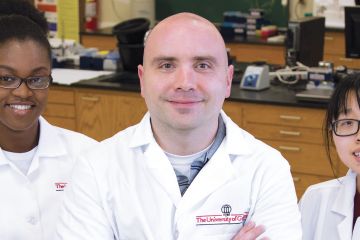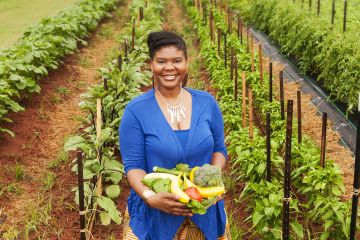10 Milestones in FACS History
One fine September day in 1918, University of Georgia Chancellor David Barrow invited 12 women into his office to facilitate their enrollment.
A long, protracted effort for undergraduate women to gain admission to the University of Georgia had ended.
Those first 12 - Lois and Evelyn and Etta and Edith and Sybil and Mattie - and others - were committed to pursuing home economics education, standing on the shoulders of other before them who pried open the doors to higher education for women.
Together, they dismantled barriers and set in motion a spirit of persistence and problem-solving and outreach that a century later still defines the College of Family and Consumer Sciences.
It is a story worth celebrating.
1. Opening Doors February 23, 1918
With the support of State College of Agriculture President Andrew Soule, a bachelor’s degree for women is created within the college’s Division of Home Economics. Soule names Mary Ethel Creswell, who previously served as director of the USDA’s Cooperative Extension Service home economics programs in 15 Southern states, as the director of the new division, which includes two faculty members. Twelve women begin classes in September and would graduate in 1920. Creswell would become the first woman awarded a baccalaureate degree from the university in June 1919, based on classes taken at the Normal School in Athens, the University of Chicago and “clandestine” classes at UGA. She would serve as director, then dean of what became the School of Home Economics, until 1945.

2. Breaking Ground, Marching On June 13, 1919
A cornerstone is laid for the “women’s building,” which would house the new division upon its completion in 1920. The building contains 37 bedrooms, a gymnasium, a laboratory, classrooms, a lounge and a swimming pool. It is later named Soule Hall in honor of the State College of Agriculture president who advocated for the creation of the division. As part of the program, Georgia Governor Hugh Dorsey gives an address and attendees sing an updated version of “Glory, glory to old Georgia” that includes the lines “Higher education was not meant for men alone … the world is marching on.”
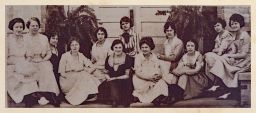
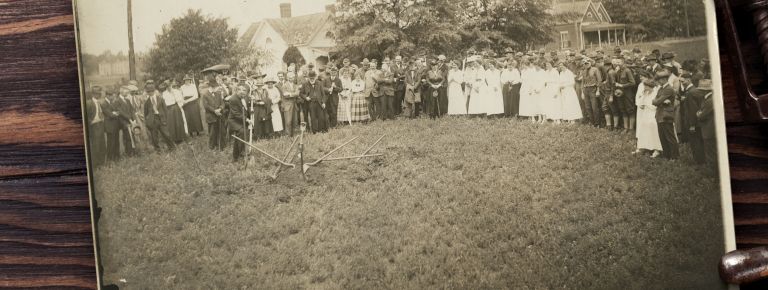
3. A Place to Call Home 1932
Dawson Hall, named in honor of Edgar Gilmer Dawson, the father of Dr. William Terrell Dawson, is completed in January and houses home economics, applied arts and a cafeteria. A 26,000-square foot addition to the building, later named Speirs Hall in honor of the college’s third dean, begins in 1966 and is completed in 1971. “Pou’s Pillars,” named for Dean Emily Quinn Pou, are added in 1982 and the building’s front entrance is moved to face west.

4. The School of Home Economics 1933
The division of home economics merges with the State Normal School to form the University of Georgia School of Home Economics. Enrollment in the school peaks at 299 students. Enrollment would top 400 students by 1940.
5. Growth and Construction 1939
The fourth home management house, in addition to a Child Development Lab, is completed with funds provided by the federal Works Progress Administration. Construction on the first house, built to provide students with hands-on research opportunities and “laboratory housing in home management” for eight students and an advisor, began in 1932. The residence requirement is eliminated in 1987. The Child Development Lab would be named in honor of Margaret McPhaul, the longtime director of the Nursery School, in 1973. Beginning in 1983, children with disabilities are integrated into classrooms with typically developing children, making it one of the state’s first “inclusive” classrooms.

6. Room for More 1968
Peter Stegmayer becomes the first male student to receive an undergraduate degree in home economics, earning a degree in diet and institution management. In fall 2017, there were 311 males studying in FACS, or about 18 percent of the 1,746 students in the college.
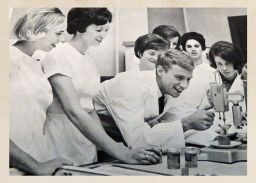
7. First Ph.D. Program 1976
A Ph.D. program in Child and Family Development is approved by the Board of Regents. Lynda Henley Walters received the school’s first doctorate in 1978. Walters would later serve as the college’s associate dean from 1982-91.
A Ph.D. program in foods and nutrition would follow in 1980; the doctorate in textile sciences within the department of textiles, merchandising and interiors begins in 1990, and a Ph.D. in housing and consumer economics begins in 1994.
“The philosophy and thoughtfulness of those who came before us is a legacy we pass on to those who will succeed us,” Walters said in a 1994 article that appeared in Highlights, the college’s alumni newsletter.

8. The College of Home Economics 1978
The School of Home Economics becomes the College of Home Economics,
effective Sept. 14. A publication of the University System of Georgia states: “The School
(of Home Economics) now offers the Ph.D. in child and family development. The
term “School” does not convey either identification with the Ph.D. degree or a colleagueship image with other units of the university. It is felt that the prestige stemming from this redesignation would assist in attracting students from within
the state of Georgia, the region, and other parts of the country.”

9. A New Name 1990
After years of debate among faculty, students and alumni, the college is renamed the College of Family and Consumer Sciences. More than 70 percent of students responding to a survey at the time said changing the name of the college would increase the value of their degrees. Among the many reasons given in support of the name change is to counter a negative stereotype associated with the phrase “home economics” among some students and employers. A previous effort to change the name to the College of Human Ecology failed in 1987.
10. A Time to Celebrate 2018
Launched on the Martin Luther King Day of Service with a commitment to service in the community, the college celebrates 100 years of offering programming at UGA. In addition to the student-led day of service, the college hosts the FACS 100 Centennial Gala at The Classic Center. UGA President Jere Morehead gives remarks and the FACS 100 Centennial Honorees and members of the Honor Hall of Recognition are celebrated. The college publishes a 140-page pictorial history book, “100 Years Enriching Lives: Family and Consumer Sciences at UGA” and an exhibit featuring the enrollment of women at UGA and the history of the college leading up to the current programs is displayed in the Richard B. Russell Building Special Collections Libraries. A centennial website captures the essence of the year: www.fcs.uga.edu/centennial

